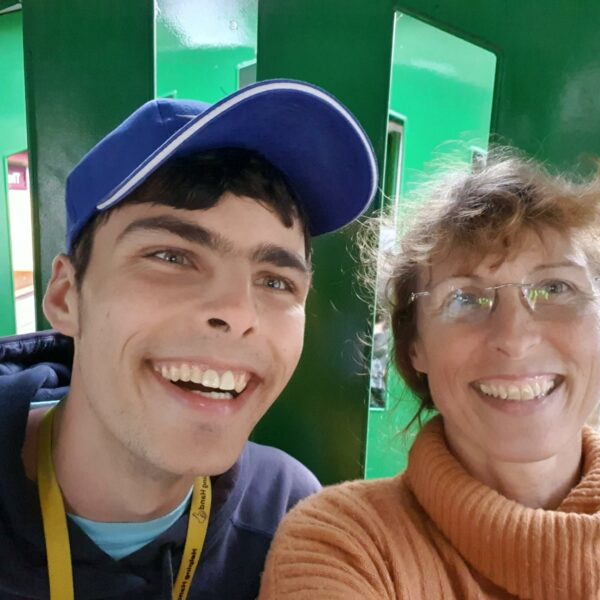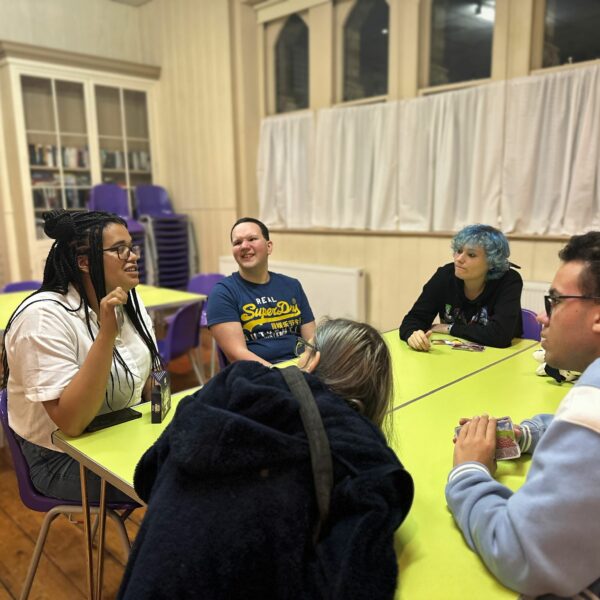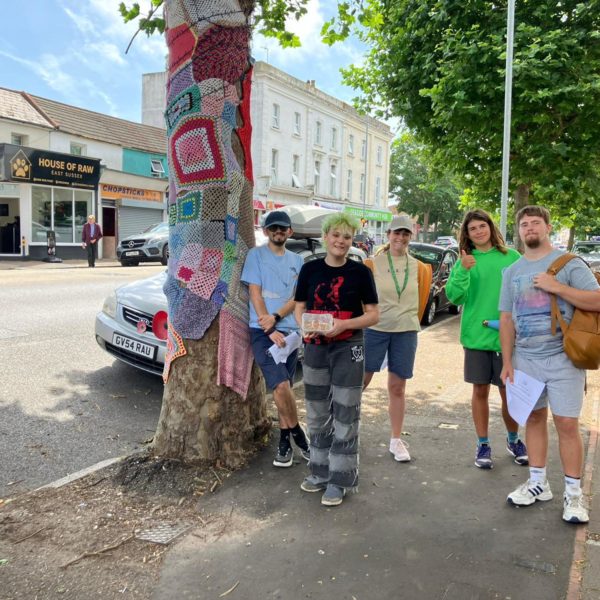Puberty, sex and relationships
As a parent or carer, you will play a vital role in supporting your young person through adolescence so that they can become confident, knowledgeable adults who can make informed choices about their bodies. It pays to start thinking and talking about some of this stuff earlier rather than later. Being open and honest when you talk about puberty or sex is really important, as is ensuring that your young person has access to good sex education and health care.
How and when to start talking
All young people will have sex education lessons as part of the PSHE curriculum in school. They can also access information and advice from your local sexual health service. See details at the bottom of this page. But they will still rely on you to help them navigate the changes that come in their teenage years and beyond.
You can start talking to your child about how their body works and grows from an early age and build on this knowledge gradually as they grow older. If they ask you questions, be honest and factual but don’t feel you have to go into too much detail all in one go. Building their knowledge slowly over time will be less overwhelming than having the ‘big talk’ about sex.
Use words your child is familiar with and gradually introduce the correct medical names for their genitals and other parts. This is especially important if your disabled young person requires intimate personal care or has lots of medical appointments. If you aren’t with them, they need to be able to understand and use the language that carers and medical professionals use. They also need to understand the concept of ‘private’ parts.
Puberty
As far as possible, all children and young people need to be prepared for the changes to their body before they take place. Every young person is different, but here are a few ideas you might want to talk about:
- The name and function of the sex organs
- What changes to expect at puberty
- How society expects them to behave in public
- How to keep safe from exploitation and abuse
- Relationships and responsibility
- Preventing unplanned pregnancy and sexually transmitted infections (STIs)
Many children will have sex education lessons in Years 5 or 6 in primary school or certainly as part of their PSHE (Personal, Social, Health Education) or science lessons in secondary school. These will cover puberty, sex and relationships. You may want to talk to a teacher at school about your child’s sex education programme, especially if you feel they might be anxious or if you feel they might benefit from some preparation at home beforehand. Your child may also need some points to be reinforced at home afterwards. They may come home with worries relating to their medical condition or disability. If possible, you need to be able to allay their fears. If you don’t have the answers, you could contact the local or national support group for your child’s condition to draw on their experience and advice.
Changes for girls
Most girls begin puberty at some time between 8 and 14 years of age, with 11 being the average age. Girls generally develop quicker than boys and most girls reach full sexual maturity within four years of starting puberty.
Girls will develop body hair in their underarms and around their genitals. Their breasts will grow and they may begin to have sexual desires. They may also experience psychological changes like rapid mood swings, self-consciousness and increased aggression or begin to experiment with certain risky behaviours like smoking or drinking.
Menstruation or periods
Having periods marks a new phase in the development of a young woman’s emotional and physical maturity. It makes sense to talk to your daughter about menstruation well before the first period so that they can be reassured it’s a normal process. She needs to know why she’s bleeding and that it will stop in a few days. Once a regular cycle is established, it may be useful to keep a diary of the menstrual cycle, or encourage her to, so she knows roughly when it will happen again.
The age at which menstruation may begin can vary – as young as nine is not uncommon. There is nothing wrong if menstruation begins early, or if it starts much later than average.
Make sure your daughter has information about period pants, pads and tampons and how they are used. Buy some products, take them out of the wrappings to show her and perhaps demonstrate on a doll. Usually pads are quite easy for a girl to put in place herself, but sometimes she may need help because of the nature of her special educational need or disability. Emphasise the importance of personal hygiene and cleanliness during menstruation.
It is important to emphasise that periods are a private thing and she should not talk to everybody about it. But let her know that she can talk to you, her teacher, the school nurse or a female friend.
Changes for boys
Boys tend to develop a little later than girls. Most boys begin puberty at 9-14 years of age, with 12 being the average age. Again, most boys reach maturity within four years of starting puberty.
Your son may experience a rapid growth spurt and experience the mood swings and changes in behaviour we mentioned in the ‘girls’ section. He will begin to grow hair on his face, in his underarm area and around his genitals. His voice will break at some point in this process and his penis will grow. He will begin to experience sexual desire and may have wet dreams.
Tell your son about wet dreams and that they are perfectly normal and may sometimes happen when he’s asleep. Your son needs to understand that ejaculation can also occur during masturbation.
Boys may be embarrassed or worried and need reassurance that this is a normal part of growing up. They also need to know that this is a private thing, and that semen should be wiped up with a tissue and thrown away. Along with personal hygiene, this is a responsibility which is part of growing up.
National charity, Contact, produces two really useful guides to growing up, sex and relationships: one for parents and one for young people themselves. See Puberty and growing up | Contact
Personal care
Children and young people who need intimate personal care such as help with washing or going to the toilet, may find it embarrassing as they get older and go through puberty. It’s important, therefore, to ensure that you or any carers who provide personal care are respectful and sensitive towards your young person. You can do this by:
- Giving your young person a say in their personal care plan
- Making sure that the care plan is assessed and updated as and when your child’s needs change
- Finding out if there are ways that your young person could manage their intimate care needs themselves, using aids or equipment
- Making sure that the number of people who provide intimate care to your young person is kept to a minimum
- Asking your young person before you provide intimate care and ensuring that they know why it is needed.
- Keeping things consistent – ensure that anyone who provides intimate care to your young person uses the same language for parts of the body and functions
Masturbation
Exploring your body and getting to know what feels good is natural as you grow up, but for young people with learning disabilities, there may be issues with both opportunities and privacy.
Your young person’s right to privacy should be respected. You should try to knock and wait a moment before going into a bedroom or bathroom and ensure that other carers, such as support workers, are equally respectful.
Some young people with learning disabilities don’t always understand the difference between private and public. It is important to try and support your child to know that masturbation is natural and not wrong, but that it is only right on their own in a private place, like their bedroom or in the bathroom.
Brighton and Hove parent carer Catherine Newell runs online workshops for parent carers around supporting their young person’s ‘private time’.
Sexual relationships
Our young people are sexual beings like everyone else and they deserve the same opportunities for socialising and sexual expression as their non-disabled peers. Parents of disabled young people have a special role in providing support and guidance to help our children embrace the challenges of adolescence and grow into informed, confident adults.
Disability can affect sexual development, however. For example, a lack of privacy and independence in daily living can mean a young disabled person misses out on early sexual experiences like kissing and flirting. Cultural prejudices, professional and parental attitudes, lack of social opportunities and a lack of appropriate services can also stop disabled people achieving sexual and emotional fulfilment.
Some families and professionals working with young people may avoid discussing issues of sexuality for fear of exploitation and pregnancy, or a parent may be reluctant to see their child as a sexual being. But avoiding the issue of sex and sex education will not make your child’s sexual desires go away – it may instead make your child feel confused and fearful, especially if they misunderstand what they’ve learned or hear incorrect information from their peers. Being open and honest when you talk about sex is vitally important, as is ensuring your child has access too good sex education and health care.
When and how to talk about sexual relationships
- Start talking to your child early so that problems are less likely to arise – certainly before puberty
- Talk openly and casually – while you’re doing something else, like washing up or driving the car – as this gives the message that it’s not something to be secretive about or afraid of
- Share your own beliefs and attitudes, but be prepared to discuss them and listen to your child’s point of view
- Read books, leaflets and watch DVDs or use something on TV for example to trigger a conversation
- Reinforce the fact that the most important aspects of a relationship are love, friendship and mutual respect
- Listen rather than judge. Try asking them what they think
- Answer questions and don’t be afraid to say: ‘I don’t know – let’s look it up together’
- Don’t bombard your child with questions or talk too much. Many children say it’s awful to get a ‘big talk’ on sex or have questions fired at them. ‘Little and often’ can be best to give them an opportunity to absorb information, rather than lots of detail all at once
- Remember disabled people have relationships with other disabled people and with non-disabled people too
- Remember same gender relationships are as common for disabled people as for non-disabled people
See the Family Planning Association (fpa.org.uk) CD about sex, sexuality and relationships for people with a learning disability
Sexuality
Young people with additional needs are as likely to experience same-gender attraction as anyone else, so it’s important to lay the groundwork to make sure your child knows you’re a safe person to talk to about these feelings. Don’t wait for signs your child might not be straight, or assume your child knows you would be accepting.
Being both disabled and queer can bring extra challenges – this is sometimes called intersectionality. For example, young people who need support to attend places where other LGBTQ+ people meet, like gay clubs, can face reluctance from support workers or family members to take them to these places, or they might find these spaces sensory overloading, physically inaccessible, or unwelcoming. They are also extremely vulnerable to homophobic bullying and harassment, which is unfortunately still all too common. Disabled young people may be afraid to come out if they fear a negative reaction from the people they rely on. The study “Secret Loves, Hidden Lives?” explores some of the barriers faced by people with learning disabilities who are gay, lesbian or bisexual.
Sometimes people assume disabled people don’t have any sexuality at all, or are uncomfortable with the idea. It’s important to make space for your young person to understand and express their sexuality. In fact, autistic people in particular are significantly more likely to be LGBTQ+ than the general population. This may include an increased likelihood to be on the asexual spectrum as well – this can present in many different ways, however, and it’s worth being aware many asexual people still experience romantic attraction and enjoy being in relationships.
Resources and support
Some groups and organisations that may be able to help:
- Allsorts – charity for LGBTQ+ youth and their families in Sussex
- Switchboard – helpline for LGBTQ+ people in Brighton & Hove and their families
- FFLAG – national charity for LGBTQ+ people and their families
- LGBT Aspies – facebook group for autistic people aged 16+ who are LGBTQ+
Useful resources:
- Mencap’s Easy Read relationships and sex information includes LGBTQ+ advice and information for people with learning disabilities
- Ambitious About Autism LGBTQ+ resources were created with LGBTQ+ autistic young people
- Deaf Rainbow offers resources for Deaf LGBTQ+ people
- Supported Loving toolkit – these resources about supporting disabled LGBTQ+ people are aimed at care workers but may be of interest to parents and carers as well
Gender identity
Most of the information and resources in the sexuality section above also apply to supporting your child or young person if they are transgender or nonbinary, or unsure of their gender. Below are some trans-specific resources and organisations as well, however.
Many parents may be unsure where to start or have a lot of questions. Young Minds has a guide for parents about gender identity that explains terms you may encounter, and provides some useful tips and guidance.
Studies have found a strong link between being autistic and being gender diverse (transgender, nonbinary or genderqueer) – Ambitious About Autism provides information for autistic young people about being transgender.
Accessing healthcare when you’re transgender can be challenging at times. Trans Actual provides guidance for neurodivergent and disabled trans people on navigating healthcare that you may find useful as you support and guide your child or young person. If your young person is over 18 and struggling with their mental health, Mindline Trans + is a national helpline for gender diverse adults and their families.
Stonewall notes that some disabled and/or neurodivergent LGBTQ+ young people face specific barriers to entering or remaining in education, training, or work, and shares some useful resources and links here: young futures: disabled and neurodivergent LGBTQ+ support
Some groups and organisations that may be able to help:Resources and support
Protecting your child from abuse
There are a number of reasons why disabled children and young people can be more vulnerable to abuse. Their learning disabilities may mean they have less understanding about ‘personal’ and ‘private’ parts of the body, particularly if they rely on intimate care or have frequent medical examinations where they need to undress or be undressed. Or they may have communication difficulties which affect their ability to speak out about abuse.
The best way to protect your child is to have an open and loving relationship based on honesty. You can reassure your child there is nothing so awful and embarrassing they couldn’t talk to you about it. If your child uses signs or symbols, be sure to introduce ones which allow them to communicate about their body and feelings.
Try to make sure your child understands the difference between wanting to touch and kiss someone and doing something that feels wrong or scary. Teach them that their body belongs to them and that it is not OK for someone to touch them if they do not want them to.
Discuss with them how they might handle a situation where they feel uncomfortable or perhaps you could rehearse and role play – practice shouting ‘No’ and calling for help and talk to them about who they might turn to if they are frightened or worried – you as their parent, a teacher, a police officer, a bus driver, a lifeguard – depending on where they are at the time.
However, it’s important to keep these risks in perspective. Thankfully, it’s still rare for children to experience abuse or assault. Give your child the confidence, knowledge and skills to protect themselves, and let them enjoy exploring all that life has to offer.






